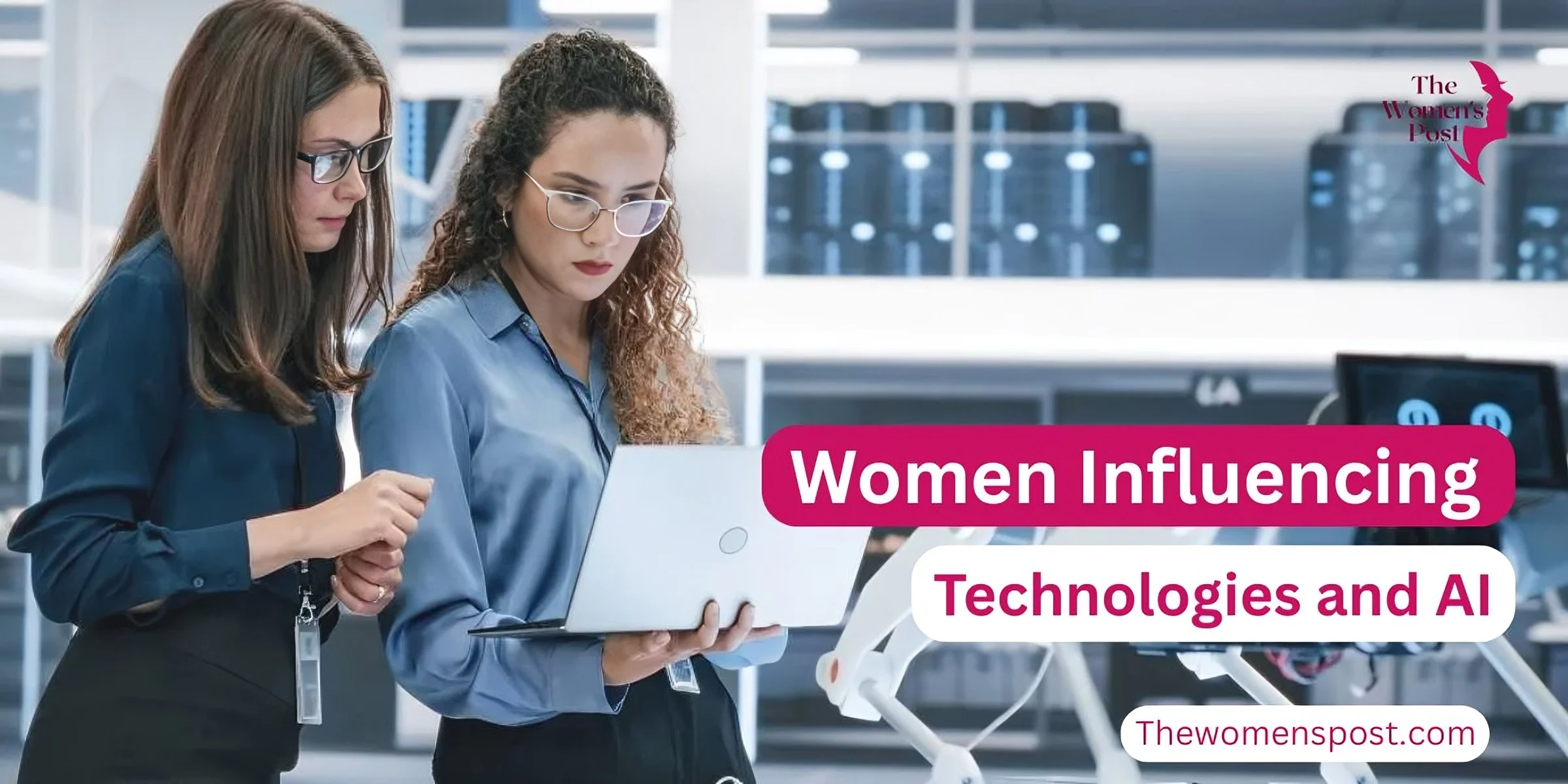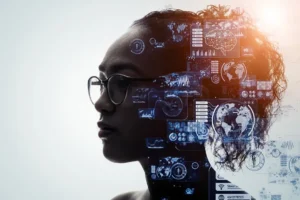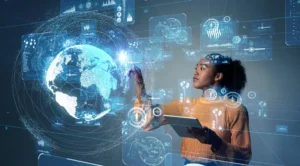Women Influencing Emerging Technologies and AI

From our jobs to our way of life, artificial intelligence (AI) and new technologies are altering the planet. Women in artificial intelligence are driving fresh ideas, spearheading innovative projects, and ensuring that AI is fair and inclusive—all of which are essential roles in this change.
Though underrepresented, their efforts are helping to shape technology going forward. This paper investigates these women’s background, education, and motivations for their work as well as their It also includes responses to often asked questions about women in artificial intelligence.
Notable Women Leading in Artificial Intelligence
These six remarkable women are greatly influencing artificial intelligence and new technologies. Though each has a different background, their love of justice and creativity highlights why women are crucial in artificial intelligence and technology.
Dr. Fei-Fei Li
- Age: 49; born in 1976
- Origin: Originating in China, today I live in the United States.
- Education: Caltech produced a Ph.D. in electrical engineering.
- Contributions: Known as the “Godmother of AI,” Dr. Li co-director of the Stanford Institute for Human-Centered AI and professor at Stanford University. She developed ImageNet, a vast collection transforming computer vision by enabling computers to identify images. Her work on women in artificial intelligence highlights the part women will play in ethical AI development and aims to make AI useful and moral for society.
Cynthia Breazeal
- Age: 58 (started 1967)
- Origin: America
- Education: Massachusetts Institute of Technology Ph.D. in robotics
- Contributions: Donations: Establishing Jibo, a company creating personal assistant robots, Cynthia pioneered social robotics. Currently serving as Dean for Digital Learning at MIT, she works on artificial intelligence with human emotional awareness. A fundamental tool in the field of human-robot interaction is her book, Designing Sociable Robots, MIT Media Lab). Her leadership emphasises the reason women matter in artificial intelligence and technology.
Timnit Gebru
- Age: 43; born in 1982
- Origin: Born in Ethiopia, today I live in the United States.
- Education: Stanford University awarded Ph.D. in electrical engineering and computer science
- Contributions: Timnit co-founded the distributed artificial intelligence research institute (DAIR) and Black in AI. Working to lower prejudices in AI systems that might endanger underprivileged groups, she emphasises the part women can play in the ethical development of artificial intelligence. Her advocacy has made her a leading voice for justice in technology, proving how women are lowering bias in artificial intelligence systems (DAIR).
Also Read: Brittany Wenger: Scientist Saving Lives and Tech Entrepreneur
Mira Murati
- Age: 37 (born 1988)
- Origin: Originally from Albania, today I live in the United States.
- Education: Dartmouth College produced a master’s degree in product design and a bachelor’s degree in mechanical engineering.
- Contributions: Mira, former OpenAI CTO, helped create ChatGPT and DALL-E tools that have revolutionised AI use. Currently heading Thinking Machines Lab, she emphasises women’s contribution to ethical artificial intelligence development (OpenAI). Her efforts emphasise the reasons women matter in artificial intelligence and technology.
Dr. Lisa Su
- Age: 56 (1969 was born).
- Origin: American country
- Education: MIT produced a Ph.D. in electrical engineering.
- Contributions: Dr. Su has guided AMD towards leadership in artificial intelligence-driven chip technology as President and CEO. She is a fervent supporter of diversity in STEM and has authored over forty technical papers, so motivating more women in AI (AMD).
Summary of Key Contributors
|
Name |
Age | Origin | Education | Key Contribution |
| Dr. Fei-Fei Li | 49 | China/USA | Ph.D., Caltech |
Designed ImageNet, spearheads Human-Centered AI |
|
Cynthia Breazeal |
58 | USA | Ph.D., MIT | Started Jibo and pioneered social robotics. |
| Timnit Gebru | 43 | Ethiopia/USA | Ph.D., Stanford |
Advocates ethical artificial intelligence founded DAIR. |
|
Mira Murati |
37 | Albania/USA | Bachelor’s and Master’s degrees from Dartmouth | Created DALL-E, ChatGPT |
| Dr. Lisa Su | 56 | USA | Ph.D., MIT |
Leads AMD in artificial intelligence chip technology |
Also Read: The Soft Power Shift: How Women Are Redefining Influence Online?
The State of Women in Artificial Intelligence

Women in artificial intelligence still represent less than despite these successes. Key figures are as follows:
- Based on a 2018 survey (Wired), just 12% of machine learning researchers are women.
- At Google, women occupy 21% of technical positions; at Facebook, they account for 22%.
- Women account for 26% of data and AI roles worldwide (World Economic Forum, 2020, Deloitte).
- The Stanford AI Index Report, 2021, Deloitte shows just 16% of tenure-track AI faculty are women.
- Only 20% of women in low-income nations have internet access, so restricting their capacity to enter the AI sector (UN Women).
- UN Women reports that 25% of AI systems exhibit both gender and racial bias while 44% exhibit gender bias.
These figures clearly show a gender disparity, so highlighting the difficulties faced by women pursuing artificial intelligence degrees. Since artificial intelligence influences everyone and without different voices it might not fairly serve all people.
Why Women Count in AI
Women in artificial intelligence bring different points of view that improve and equity of artificial intelligence Here are the reasons women matter in artificial intelligence and technology:
- Research indicates: That diverse teams—including women in artificial intelligence—create up to 30% better outcomes in innovation and ethical decision-making (IMD). Ideas of women enable fresh approaches to address challenges.
- Leading initiatives: How women are lowering bias in artificial intelligence systems are Timnit Gebru and Joy Buolamwini. Women in artificial intelligence, for instance, are striving to correct facial recognition systems that frequently misidentify women and people of colour.
- Encouraging the Future: Successful women in artificial intelligence inspire young girls they can too. This over time helps to close the gender difference.
Offering education, events, and support for women in artificial intelligence (WAI), companies like Women in AI (WAI) are helping. Programmes like AI4ALL also educate young women about artificial intelligence, so motivating them to enter the field despite obstacles for women pursuing AI professions.
Also Read: Rana Hajirasouli: Redefining Waste Management with Sustainable Solutions
Challenges Women Experience
Women in artificial intelligence encounter several challenges in AI and developing technologies:
- Low Representation in STEM: Women account for just 29% of STEM workers, so restricting the number entering AI and hence posing difficulties for women in AI professions (UN Women).
- Bias in Hiring and Promotion: Some firms might ignore women for technical roles or leadership positions, so aggravating women in AI professions.
- Lack of Early Encouragement: Further aggravating the difficulties for women in AI employment, many countries lack early encouragement for girls to study math or science—key for AI careers.
Chances for Transformation
There are several ways one might assist women in artificial intelligence:
- Education and Training: Programmes like AI4ALL and Women in AI provide seminars and mentoring to equip women about artificial intelligence, so addressing the difficulties for those pursuing AI professions.
- Inclusive Workplaces: Companies can design spaces where women feel appreciated and supported, so promoting inclusive workplaces.
- Role Models: Emphasising women like Dr. Lisa Su and Mira Murati will encourage others to seek artificial intelligence jobs by demonstrating why women are vital in technology and AI.
Women-Led Projects in Artificial Intelligence

Starting their own artificial intelligence businesses, some women demonstrate how they can lead in this field:
- Affectiva: Dr. Rana el Kaliouby co-founded Affectiva, a company creating artificial intelligence with human emotional understanding.
- Defined.ai: Daniela Braga started it and offers defined.ai data solutions for artificial intelligence development.
- Anthropic: Reflecting the role of women in ethical AI development, this company co-founded by Daniela Amodei focuses on safe and interpretable AI systems (Anthropic).
These projects demonstrate how women in artificial intelligence are leading rather than only participating.
Conclusion
AI and developing technologies are being powerfully shaped by women in artificial intelligence. Their efforts are improving technology for all from designing new tools to advocating justice via women’s involvement in ethical artificial intelligence development.
Though underrepresentation still presents difficulties for women in AI professions, the efforts of women like Dr. Fei-Fei Li, Cynthia Breazeal, and others are opening the path for a more inclusive future. Supporting women in artificial intelligence by means of fair opportunities, mentoring, and education helps us to create a society whereby technology reflects the variety of its consumers.
Also Read: Women in Gaming: How Female Streamers Are Changing the Game?
FAQs About Women in Artificial Intelligence
1. Why is diversity of gender important in artificial intelligence?
Gender diversity guarantees that artificial intelligence benefits all. Women’s viewpoints help to create more equitable systems and lower prejudices, so enabling technology to be more inclusive. Women are thus very important in artificial intelligence and technology for this main reason.
2. What obstacles must women overcome in artificial intelligence?
Women in artificial intelligence professions suffer with limited STEM education, hiring bias, and lack of role models among other things. Furthermore deterring girls from pursuing technology are cultural preconceptions.
3. How might more women in artificial intelligence be encouraged?
Early STEM education, mentoring, and scholarships are among things we can offer. Two excellent initiatives helping women in artificial intelligence are AI4ALL and Women in AI.
4. In ethical artificial intelligence, what part do women fulfil?
Leading efforts towards women in ethical artificial intelligence development are women in artificial intelligence. They investigate prejudices and support laws guaranteeing that artificial intelligence does not negatively affect underprivileged communities.
5. Exist any successful AI startups headed by women?
Companies including Affectiva (Dr. Rana el Kaliouby), Defined.ai (Daniela Braga), and Anthropic (Daniela Amodei) are creating waves in artificial intelligence by demonstrating how women are lowering bias in AI systems and inspiring innovation.









